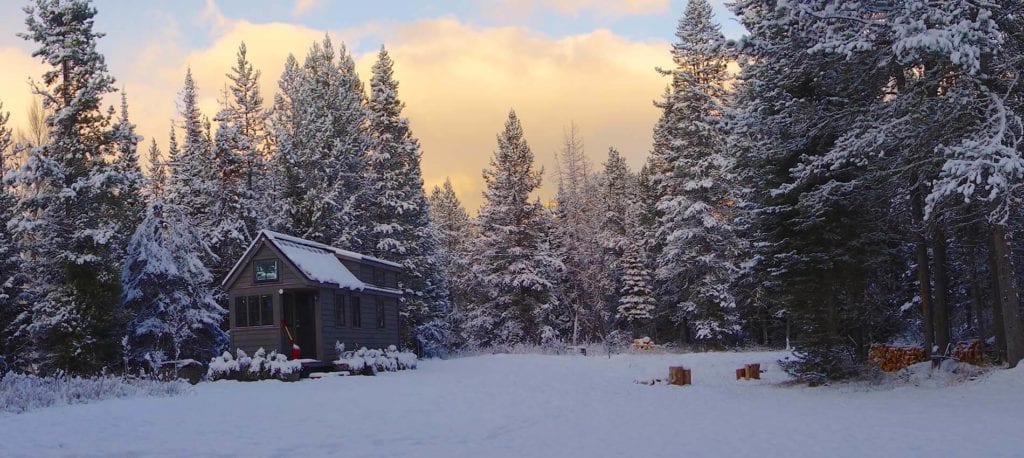If you’ve decided to take your life off-grid—that is, to set up a home site off the main utility grid and commit to a life of total self-sufficiency—then there’s a good chance you’ve got some qualities already suited to that lifestyle. You’re probably a tenacious problem-solver who isn’t afraid to get your hands dirty, calloused, or cut. You’re probably happiest when you’re outside. You’re probably very skilled in wilderness survival and can chop wood like it’s nobody’s business. You probably live by the Boy Scout motto. Basically, you’re Paul Bunyan. You just need the ox.
There’s a laundry list of reasons why you might want to ditch the grid, but you’ll only be able to take full advantage of this lifestyle if you are mentally and physically prepared—you’ve got to know your stuff and be ready for anything. Living off the land is hard work, and survival—including acquiring reliable sources of food, shelter, and water—becomes your sole purpose. Anything that might distract you from that can put you in danger.
Looking at some of the pros and cons of off-grid living is a good way to help you decide whether or not you should officially hop head-first into homesteading or living off the land.

Pros of living off the land:
- Improved Self-Sufficiency – One of the greatest benefits of opting out of regular society is that you’ll get a massive lesson in self-reliance. When you live off the land, it means you grow or hunt your own food and harvest energy from the natural resources that are available to you—like the sun or the wind. As a result, you’ll be totally self-sufficient should society collapse or resources evaporate entirely.
- A More Eco-Friendly Lifestyle – It’s amazing to think about how big of an impact our day-to-day lifestyles have on the environment. When you ditch the grid in favor of renewable energy like solar or wind power, you’re seriously reducing your carbon footprint and helping to contribute to a more sustainable society. You also learn how to contribute less to a throwaway culture by investing in more high-quality, durable gear and equipment made to be used for many years.
- Generally More Affordable – Although you may see a higher initial cost—you have to build a home, set up power, and make early investments in supplies—you will wind up saving money in the long-term when you choose to live off the land. You’ll have fewer costs associated with food, utilities, and general consumption, which could save you hundreds of thousands over your lifetime.
- Closeness to Nature – As long as you have the right all-season gear and apparel, you can count on being able to enjoy the great outdoors 365 days a year when you decide to live off the grid. When you opt for this way of life, wilderness is no longer just recreation—it’s the giver of life. That means you’ll spend the vast majority of your time soaking up the fresh air by harvesting food, managing your land, and relaxing.

Cons of living off the land:
- Occasional Loneliness – The fact of the matter is that the vast majority of humanity lives in conventional society—that is, on the grid. So, unless you plan to live in a communal off-grid environment (yes, they do exist), you should be prepared to go for days, weeks, or months without speaking to another soul. Successful off-gridders must be prepared to deal with a bit of solo blues.
- Initial Costs – It seems counterintuitive, but it’s not cheap to get started living off the land. In fact, some transitioners spend several hundred thousand dollars getting set up off the grid. There’s the cost of construction, land, a water system, and power, not to mention investments in high-quality supplies and equipment that will last for years in demanding outdoor environments. Cutting corners could be a matter of life and death in the great outdoors, so it’s best to make smart investments.
- Less Convenience – It may come as a shock, but there is no Uber Eats in the wilderness. In all seriousness, you will make a whole lot of compromises in terms of everyday living when you hop off the grid. You’ll have limited access to grocery stores, pharmacies, and equipment suppliers. Notably, you’ll also be out of reach of many professional services to assist with construction, auto repairs, plumbing, power, land management, and other fundamentals.
Questions to ask yourself before going off-grid:
If you still aren’t sure whether or not this way of life is good for you, ask yourself the following questions (if you answer “no” to any of them, you may not be ready to live entirely off the land):
- Do I have the skills it takes to grow or hunt my own food for the winter?
- Am I okay with occasionally eating food purely for sustenance, even if it tastes bad?
- Am I okay with not having meaningful human interaction each day?
- Do I have enough money for this lifestyle, with emergencies included?
- Do I have the proper resources and plans for reliable food, shelter, and water?
- Do I have a plan for emergencies, including medical care?
- Can I handle basic first-aid, and do I have the proper supplies?
- Can I dedicate the majority of my time to acquiring food, water, and shelter?
- Am I cool under pressure and happy to take extra time to solve problems?
Still not sure? Try part-time homesteading
If you believe that you’re a good candidate for off-grid life but still aren’t entirely committed to the idea of a permanent move, do what many off-gridders do: transition gradually. Otherwise known as part-time homesteading (often a reality for those who must maintain a full-time job or “regular” society responsibilities), it may be a good idea to keep one foot in society and one foot out while you get comfortable with the idea of living off the land.
As long as you’re well prepared for what’s ahead, you can be sure that this rugged, new lifestyle will be a rewarding one.
About the Author: Natalie Bucsko serves as the Marketing Communications Specialist for RefrigiWear. From the Dahlonega, GA headquarters, Natalie oversees all content, including the website, knowledge center, blog, catalog, email, and social media. Before joining RefrigiWear, Natalie worked as a Marketing Coordinator for several years at companies ranging from startups to insurance. She enjoys cooking and baking, sports, reading and spending time outdoors – especially when it is cold!

